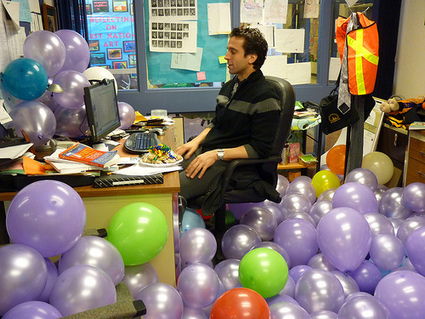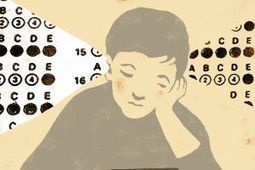 Your new post is loading...
 Your new post is loading...
"A 'Connected Educators Month' in the United States — the rapid rise of Twitter PD — the coming of age of the Personal Learning Network. No question: It’s been an historic year for connected professionals, including PLP’s extended family of teacher and school leaders. Here’s just one example: the Top 13 Most-Read Posts by our Voices from the Learning Revolution group bloggers for the year just past. Each article listed here scored more than 4,000 pageviews during 2012. Now’s a great time to read (or re-read) them, as you resolve to connect and make a difference in 2013!"
"The truth is, if you want a decent job that will lead to a decent life today you have to work harder, regularly reinvent yourself, obtain at least some form of postsecondary education, make sure that you’re engaged in lifelong learning and play by the rules. That’s not a bumper sticker, but we terribly mislead people by saying otherwise."
As was the case with the three Twitter tools every teacher should be using, I have again chopped another part from this guide and this time it is about the power of hashtags as learning mediums. According to Twitter help center, '' The # symbol, called hashtag, is used to mark keywords or topics in a tweet. It was created organically by Twitter users as a way to categorize messages.'' Hashtag is a great way for users to get a tweet to appear in search results and discussion threads. An example of a hashtag is #edtech that is used by thousands of educators all around the world. People following this hashtag find it easy to monitor what people are talking about in this category and can also participate in the conversation as well
Via Kathleen Cercone
"Unfortunately, several studies (Darling-Hammond, Wei, Andree, Richardson, & Orphanos, 2009; Murray, 2012) have indicated that most American teachers do not receive the kind of well-designed teacher professional development common in many other nations. Not only do most U.S. schools continue to rely on fragmented, ineffective one-day or two-day activities, but relatively few learning opportunities for teachers feature either the intense emphasis on content or the collegial work that has been found to positively influence teacher learning, teacher instructional practice, and student learning. Professional development is supposed to contribute to lasting change in the classroom, and when it doesn’t, we waste valuable time and resources and compromise teachers’ trust that time engaged in professional development is well spent. The time and money spent on traditional professional development is frustratingly wasteful. Workshops and conferences can raise awareness and enthusiasm and can impart knowledge, but the opportunities for reflection, collegial discussions, and continued support that are needed to bring about instructional change are rarely provided.
Most U.S. schools lack the structures and/or cultures to support the kind of job-embedded, sustained, collaborative teacher professional learning that leads to real improvements in teaching and learning. A review of the approaches common in high-achieving nations suggests directions that American schools could take to improve teacher learning and thus student achievement."
"All great teachers do great work. And not only that, but they also do different work. Great teachers are always looking to improve practice, steal ideas and try new things -- all in order to meet the needs of their students. PBL teachers are no exception. Any teacher who is truly doing PBL would also agree that it's different. There is something about being a PBL teacher that requires different work, and work that is especially capitalized when implementing a PBL project. Because I work with so many PBL teachers, I feel there are some things that PBL teachers should specifically be proud of. I present them in these six affirmations."
"Recently, I [George Couros] had the opportunity to visit Minchau School with Edmonton Public Schools, to take a look at some of the work students were doing with green-screen technology and video creation. Although this was the main reason for my visit, I also really believe in looking at the culture of a school and seeing not only what people do, but how it feels. I was extremely impressed with the environment and culture that has been developed in this school; it was beyond powerful. No matter what technology, pedagogy, or teaching practice that you try to implement in your school, relationships and culture are at the forefront of any school being successful. As I walked into the school, the first thing that I noticed were teachers spending their own time getting together before school to do some work on learning how to use iPads. Now I am not sure if this was time that was designated, but what I knew for sure was that these teachers were extremely interested in what they were doing. As I, a stranger to all of them, sat down and offered a few tips, they were eager to listen and pick up anything that I was willing to share. They wanted to learn and they wanted to learn together. Something that we expect from our kids, but do we always model it in ways that they can see?"
Daren tells a story from his past. Once upon a time when Darren was a student at the university a teacher who was serious about his expectation that his students be humorous did something that changed Darren in a powerful way. Perhaps Darren's story will change you.
The US Hispanic population soared in the past decade, comprising more than half of US population growth in that time, new 2010 census figures show.
The Hispanic population grew by 43% to 50.5m, or 16% of the total, while the non-Hispanic population grew 5%.
The non-Hispanic white population grew only 1%, shrinking as a portion of the total to 64%, down from 69% in 2000.
Click on the title to read more.
|
MOOC = Massive Open Online Course
"This space will act as an information hub for #etmooc, an open, online experience that is designed to facilitate & nurture conversations around the thoughtful integration of educational technology & media in teaching and learning.
Think of #etmooc as an experience situated somewhere between a course and a community. While there will be scheduled webinars and information shared each week, we know that there is a lot more that we will collectively need to do if we want to create a truly collaborative and passionate community.
We’re aiming to carry on those important conversations in many different spaces – through the use of social networks, collaborative tools, shared hashtags, and in personalized spaces. What #etmooc eventually becomes, and what it will mean to you, will depend upon the ways in which you participate and the participation and activities of all of its members. Let’s see if we can create something that is not just another hashtag – and, not just another course.
Some exciting topics will be explored during the #etmooc experience. We’ll be leading conversations around many of the recently popularized technologies, media and literacies including social/participatory media, blended/online learning environments, digital literacies, open education, digital citizenship/identity, copyright/copyleft, and multimedia in education. We hope that this list of topics will grow as we expand our membership and tap into the expertise of our participants. However it is not the topics that we cover, but it is what we discover, create and share together that will be critical to the success of the etmooc experience."
"Topics & Tentative Schedule (Revised as of January 9, 2013)
The 2013 tentative schedule of topics is found below. More detailed information will be provided soon, including exact dates and connection information. Each topic is 2 weeks long so that there is adequate attention and depth. Welcome (Jan 13-19): Welcome Event & Orientation to #etmooc Topic 1 (Jan 20-Feb. 2): Connected Learning – Tools, Processes & Pedagogy Topic 2 (Feb 3-16): Digital Storytelling – Multimedia, Remixes & Mashups Topic 3 (Feb 17-Mar 2): Digital Literacy – Information, Memes & Attention Topic 4 (Mar 3-16): The Open Movement – Open Access, OERs & Future of Ed. Topic 5 (Mar 17-30): Digital Citizenship – Identity, Footprint, & Social Activism
This killed me today... My 8 year old girl when asked what a Principal does, It's that person that talks to you when you've done something bad. #cpchat ...
Via Ana Cristina Pratas
"Education is currently at a crossroads as traditional methods and tools are changing as a result of advances in technology and learning theory. We are beginning to see some schools across the country take the lead in merging sound pedagogy with the effective integration of technology. These schools and educators, whether they realize it or not, are not only enhancing the teaching and learning process, but they are also providing their learners with essential skill sets pivotal for success in today’s society. These skill sets include critical thinking/problem solving, media literacy, collaboration, creativity, technological proficiency, and global awareness. The ultimate result with this shift has been increases in engagement as well as a sense of relevancy and meaning amongst learners, all of which are foundations for improving achievement. Even as we are seeing more schools and educators transform the way they teach and learn with technology, many more are not. Technology is often viewed either as a frill or a tool not worth its weight in gold. Opinions vary on the merits of educational technology, but common themes seem to have emerged. Some of the reasons for not embracing technology have to do with several misconceptions revolving around fear."
Via Stephanie Sandifer
"I love my three young children immensely. So it's hard for me to be fully rational about them. Of course they are the smartest, the best looking, and the most athletic. I'm not alone — all parents are irrational."
"Irrationality can be a strong asset. Sure, a vast majority of new businesses fail, so a fairly rational person could easily justify maintaining the status quo. But our world is — unquestionably — a better place because people take risks that don't quite make logical sense. Of course, irrationality presents challenges too. It can blind innovators to real problems and to important signals telling them to do something different. Yes, perseverance may be an underappreciated skill, but when paired with passion, it often leads to fanaticism.
So how can you toe the line between irrationality and fanaticism without pursuing a doomed idea?"
"When we tell students to study for the exam or, more to the point, to study so that they can do well on the exam, we powerfully reinforce that way of thinking. While faculty consistently complain about instrumentalism, our behavior and the entire system encourages and facilitates it.
On the one hand, we tell students to value learning for learning's sake; on the other, we tell students they'd better know this or that, or they'd better take notes, or they'd better read the book, because it will be on the next exam; if they don't do these things, they will pay a price in academic failure. This communicates to students that the process of intellectual inquiry, academic exploration, and acquiring knowledge is a purely instrumental activity—designed to ensure success on the next assessment.
Given all this, it is hardly surprising that students constantly ask us if this or that will be on the exam, or whether they really need to know this reading for the next test, or—the single most pressing question at every first class meeting of the term—"is the final cumulative"?
This dysfunctional system reaches its zenith with the cumulative "final" exam. We even go so far as to commemorate this sacred academic ritual by setting aside a specially designated "exam week" at the end of each term. This collective exercise in sadism encourages students to cram everything that they think they need to "know" (temporarily for the exam) into their brains, deprive themselves of sleep and leisure activities, complete (or more likely finally start) term papers, and memorize mounds of information. While this traditional exercise might prepare students for the inevitable bouts of unpleasantness they will face as working adults, its value as a learning process is dubious."
via Marshall Memo
In her work with UCLA's Graduate School of Education, Rebecca Alber assists teachers and schools in meeting students' academic needs through best practices. Alber also instructs online teacher-education courses for Stanford University.
"Twenty Tips for Creating a Safe Learning Environment
I visit a lot of classrooms. And I'm always fascinated by the variety of ways teachers launch the new school year and also with how they "run their rooms" on a daily basis. From these visits and my own experiences as an instructor, I'd like to offer my top 20 suggestions for keeping your classroom a safe, open, and inviting place to learn."
|
 Your new post is loading...
Your new post is loading...
 Your new post is loading...
Your new post is loading...





















